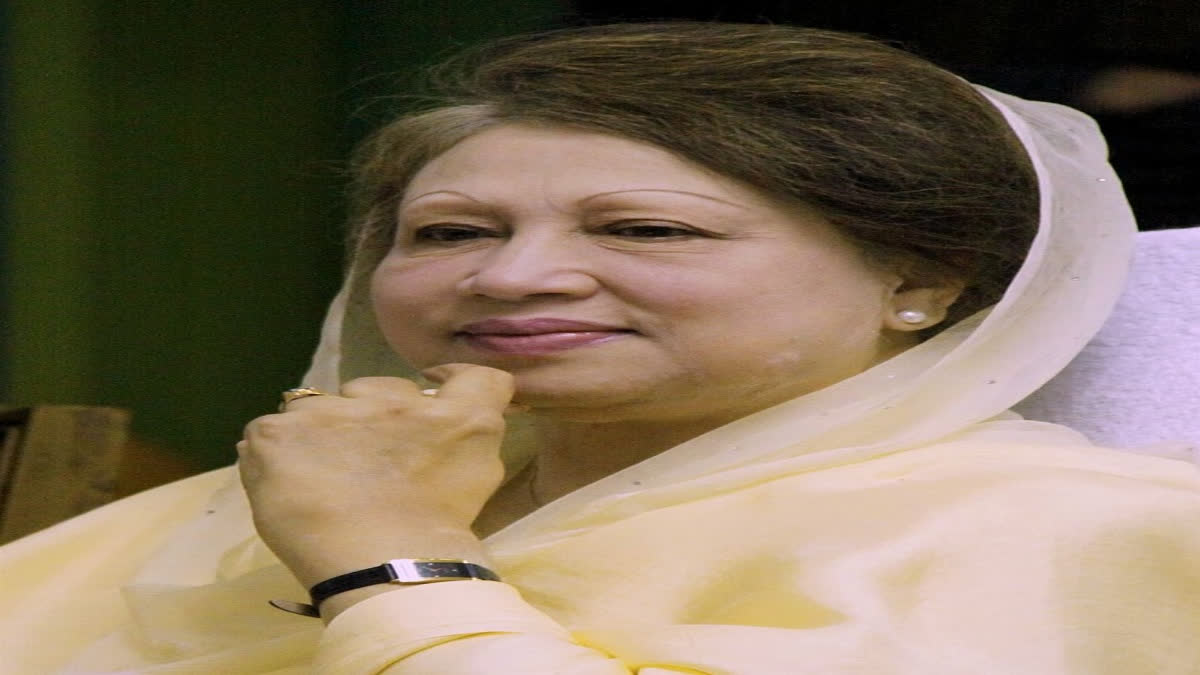New Delhi: Ahead of the parliamentary elections to be held towards the end of this year or the beginning of next year, ailing former Bangladesh Prime Minister Khaleda Zia, who is currently under house arrest, has again been denied permission to go abroad for treatment. Home Minister Asaduzzaman Khan said on Monday that there is no scope to change the decision about sending Bangladesh Nationalist Party (BNP) chairperson Khaleda Zia abroad for treatment after the country’s Law Ministry gave its opinion on Sunday.
“As there are legal complications in this regard, I sent the letter to the Law Ministry to know their opinion. The Law Ministry informed us that it is not possible. I do not think there's anything else we can do now,” Khan told the local media. Khaleda was sent to prison in February 2018 after she was sentenced to a total of 17 years in two separate corruption cases involving the Zia Orphanage Trust and the Zia Charitable Trust.
She was initially kept at Old Dhaka’s abandoned central prison, but in April 2019, she was shifted to the Bangabandhu Sheikh Mujib Medical University for treatment. Following the COVID-19 pandemic outbreak, the government temporarily freed Khaleda from jail through an executive order by suspending her sentence on March 25, 2020, with conditions that she would stay at her residence in the Gulshan locality of Dhaka and would not leave the country.
Following this, her release term has been extended every six months given her family’s plea. The latest extension came into effect on September 25. Khaleda, 78, has been suffering from various ailments, including liver cirrhosis, arthritis, diabetes, kidney, lung and eye problems and post-COVID complications. She has been undergoing treatment at Evercare Hospital in Dhaka since August 9.
Her supporters have been demanding that she be taken abroad for treatment. The ruling dispensation, however, citing legal complications, has denied her permission to go abroad. According to the law, Khaleda will have to go back to jail and then approach the court to seek permission to go abroad. She, however, has refused to do so.
“Prime Minister Sheikh Hasina allowed house arrest for Khaleda on compassionate grounds,” Sharin Shajahan Naomi, an academic and social activist of Bangladesh, who is currently pursuing her post-doctoral fellowship at KREA University in India, told ETV Bharat. “But the BNP wants to take her to Germany for treatment.”
Naomi said that this was strange as the normal practice for people in Bangladesh seeking medical treatment abroad is to go to either of three countries – India, Singapore, or Thailand. “The treatment cost in Germany is much higher,” she pointed out. “I see a larger political motive here. Khaleda might either seek political asylum or she may move to the UK to meet her son.”
Khaleda’s eldest son, Tarique Rahman, is living in forced exile in London after he was sentenced to life imprisonment by a Bangladesh court for being the mastermind behind the August 2004 grenade attack on a public rally organised by the then opposition party Awami League. Now, with Khaleda being denied permission to go abroad and elections approaching, speculations are rife about the next move of the BNP.
Also read: B'desh PM says predecessors destroyed key files
In the 2018 parliamentary elections, with Khaleda being ineligible to contest due to her conviction, the BNP was completely routed managing only seven seats in the country’s 350-seat Parliament. Last year, all these seven members of Parliament resigned alleging the Awami League government to be autocratic. The BNP had earlier boycotted the 2014 parliamentary elections citing unfair conditions following months of protests, strikes and blockades.
“One possibility is that the BNP may again boycott the upcoming elections,” Naomi said. “At the same time, one faction might contest leading to a split in the party.” So, what does this all mean for India? According to Naomi, India’s interests are best served by incumbent Prime Minister Sheikh Hasina. “Hasina is committed to ensuring security in India’s northeastern region,” she explained.
“In fact, Prime Minister Narendra Modi has singled out Hasina for praise for security in the Northeast. On the other hand, BNP has a policy of supporting insurgents in the Northeast. Their plan is also backed by pro-Pakistan groups both outside and inside Bangladesh.”
According to Naomi, if the BNP all contests the elections and goes on to win, it will not be good for India. “There will be chaos in Bangladesh and the fallout will be felt in India and its northeastern region,” she said. “India should be more diplomatically active in Dhaka now. There should be more collaboration between India and Bangladesh (across different sectors).”
Naomi said that, of late, pro-Pakistan groups and orthodox religious groups with a Taliban mindset have become stronger in Bangladesh, which should not be encouraged. So, what are the prospects for Sheikh Hasina and the Awami League, which has been in power since 2009, in the upcoming elections?
“Sheikh Hasina should come back provided there is no outside interference,” Naomi said. “She brought about stability and development in Bangladesh. The security situation in Bangladesh now is very good.” She further said that despite the activities of the fundamentalist groups, the silent majority supports Sheikh Hasina. “People in Bangladesh, particularly the new generation, are more interested in the national cricket team than the BNP’s politics,” Naomi signed off.



